15 and counting: The Queen prepares to appoint her newest PM
--- Updated 10:19 AM ET, Fri September 2, 2022 --- Source -- https://www.cnn.com/2022/09/02...-cmd-intl/index.html
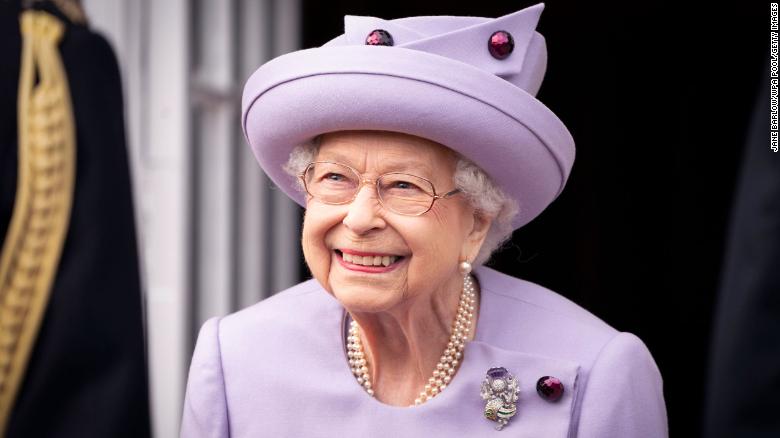
The Queen attends an Armed Forces Act of Loyalty Parade at Holyroodhouse on June 28 in Edinburgh, Scotland.
A version of this story appeared in the September 2 edition of CNN's Royal News, a weekly dispatch bringing you the inside track on Britain's royal family. Sign up here.
London (CNN)We're back, royal readers, and in just a few days' time the new leader of the governing Conservative Party -- and consequently, the country's next prime minister -- will be announced. As you'll recall, the Queen and politics don't usually mix, but she is involved in the transition, so let's break it down.
As head of state, the appointment of new prime ministers is one of Elizabeth II's core constitutional duties, along with the State Opening of Parliament and signing parliamentary bills into law. The race is now down to the two final contenders: Frontrunner and current UK Foreign Secretary Liz Truss and former finance minister Rishi Sunak.
The pair have spent the summer campaigning to Conservative grassroots members and the winner of that vote will be revealed on Monday. Whoever emerges victorious will be the Queen's 15th prime minister.
Normally, the practicalities are straightforward. In a nutshell, the outgoing PM makes a statement outside 10 Downing Street and then heads off to Buckingham Palace for a final farewell audience with the monarch. Shortly after, their successor travels over for their appointment. All in all, it's relatively quick, taking around half an hour. However, this time ... not so much.
The sovereign had intended to interrupt her vacation in Scotland and return to London to appoint the new PM. But in a break with royal tradition, Buckingham Palace announced Wednesday that the 96-year-old will not be making the 1,000-mile round trip, with the outgoing leader and his successor traveling to Balmoral on Tuesday instead.
According to a royal source, the decision to hold the two audiences at her Scottish country residence rather than at Buckingham Palace -- for the first time in her 70-year reign -- was made to provide certainty to the Prime Minister's diary. The source told CNN the decision was to avoid any last-minute alternative arrangements in the event the Queen finds herself experiencing any episodic mobility issues next week. As a result, Tuesday will likely be a more protracted event due to the distance between London and Balmoral and the logistics involved.
The decision also makes sense, given that more recently the Queen's presence has generally been confirmed on the day depending on how she is feeling. Case in point, a royal source told CNN Friday that the Queen would miss the annual Braemar Gathering this weekend but that Prince Charles, who usually accompanies her, would still be at the Highland Games. The decision was made for the Queen's comfort, the source said.
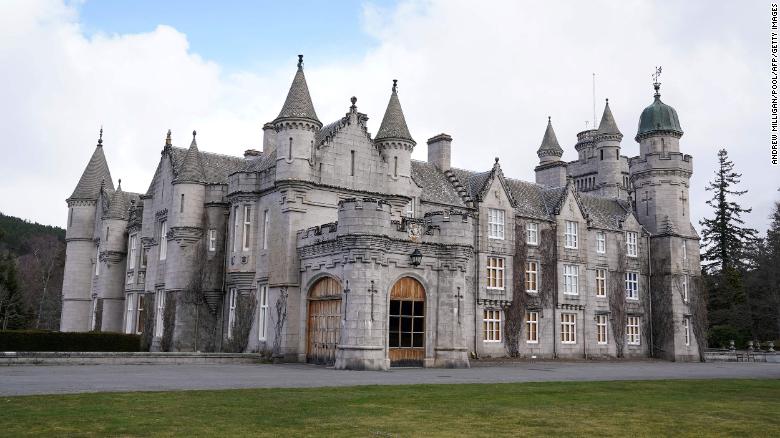
File photograph of Balmoral Castle.
The protocols for prime ministerial appointments are unwritten -- based instead on constitutional convention, according to experts.
"It's all a matter of convention that we just have a prime minister -- one minister who is more important than the others -- and that means that there are no real legal formalities to undergo for the appointment," explained Craig Prescott, a lecturer in law at Bangor University in Wales.
"Historically, the monarch would have had a much greater flexibility over who that primary adviser would be," he told CNN. "That discretion has ebbed away because there are now constitutional conventions in place that regulate who the prime minister is.
"It's very much for the political parties, and for the electorate, to ultimately decide who the prime minister is -- and the Queen effectively puts that decision into action," he added.
Prescott said the Queen is still involved because "it has to be remembered that the government is still carried on in the name of the crown. It is still 'Her Majesty's Government.'"
So how will Tuesday unfold? Well, at some point, Johnson will arrive and tender his resignation as prime minister and First Lord of the Treasury. (Fun fact: Most assume 10 Downing Street is the official residence of the prime minister but it's in fact that of the First Lord of the Treasury, a role usually held by the PM.) One of the last acts of the office is to advise the monarch on their successor (even if it's already been decided through a leadership contest). This is yet another quirk of proceedings, but one that ensures the Queen remains politically neutral, according to Prescott.
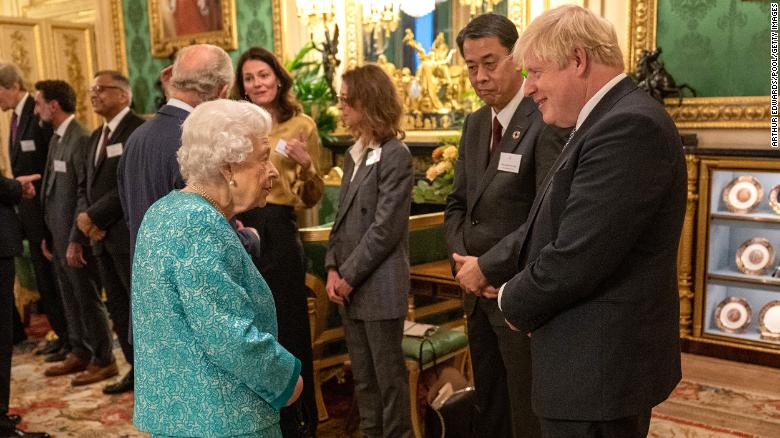
The Queen chats with Boris Johnson during a reception at Windsor Castle last October.
Little is truly known about these occasions, but some of Johnson's predecessors have touched on them in their memoirs. Gordon Brown said the final official duty of going to see the sovereign doesn't involve handing over seals of office or anything, but rather "simply saying goodbye to the Queen -- and thanking her."
In his autobiography, "My Life, Our Times," the former Labour prime minister said that "as usual, she was charming and the occasion itself was relaxed." Brown also recalled how the Queen humanized the situation by permitting his two young sons to be present when he received a parting gift -- an inscribed photograph of the monarch.
"Fraser was just four, and when he looked at the photo he said, 'That's the Queen!' -- as if it was of someone other than the person who had just handed it to him. Queen Elizabeth, startled by his response, replied: 'But I'm the Queen, I'm the Queen.' We laughed, and then we left," Brown wrote.
A short while later, the Queen will call up Johnson's replacement for a ceremonial audience known as "kissing hands." Whether or not actual hands are kissed is up for debate. Some past PMs, like David Cameron, have said the name isn't literal, while others have suggested it is.
Former prime minister Tony Blair described understanding "kissing hands" as "the laying on of the Queen's authority to govern." However, when it came to the moment, he wasn't exactly sure what that meant. In his autobiography, "A Journey," the former Labour leader recalls waiting in an antechamber to be presented to the Queen, before becoming abruptly anxious.
"A tall official with a stick stood by me. 'I should tell you one thing, Mr Blair,' he began (note 'Mrk Blair' until I had been appointed), 'you don't actually kiss the Queen's hands in the ceremony of kissing hands. You brush them gently with your lips,'" Blair wrote.
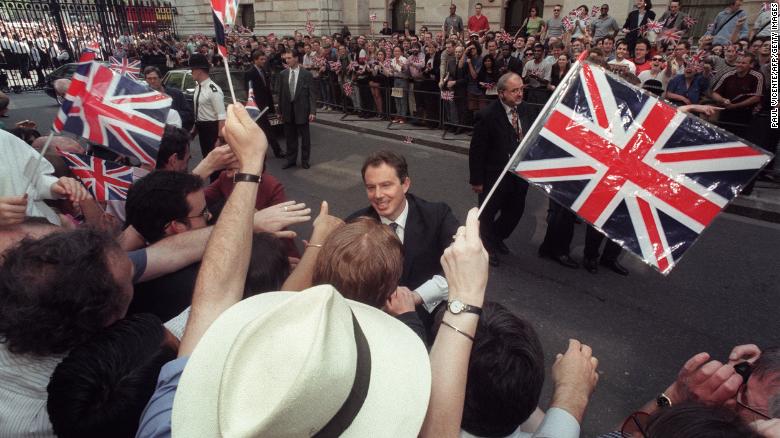
Tony Blair greets Labour supporters outside 10 Downing Street after a historic landslide election in May 1997.
Blair said he was "floored" by the remark but was left with little time to mull it over. "While I was still temporarily disconcerted, the door opened and I was ushered in, unfortunately tripping a little on a piece of carpet so that I practically fell upon the Queen's hands, not so much brushing as enveloping them," he continued, adding that the rest of the occasion went off without a hitch.
Meanwhile, the changing of location matters little constitutionally, with Prescott recalling how Herbert Henry Asquith traveled to meet King Edward VII, who was in the French city of Biarritz, to take office. It is the only appointment to have ever occurred on foreign soil and "reflects how there are so few formalities about this."
Instead, the fact that the Queen has allowed the process to be adapted for her will likely be what's important to Johnson and his successor.
"I think both the outgoing prime minister and the incoming prime minister will very much want that moment with the Queen. They will want to be seen to have a historical continuity with what's gone before. I think that that will be very important for them," Prescott said.
And amending the ceremonial formalities will also go some way to alleviating concerns from royal-watchers over her health. The fact that the monarch is making the concession to host the audiences at Balmoral rather than issue a directive authorizing Charles and his eldest son, Prince William, to step in -- as they did to open Parliament in May -- gives yet another indication that neither age nor mobility difficulties will stop the resolute sovereign from carrying out her royal duties.
FEATURED PHOTOS
The Queen has been served by 14 prime ministers during her reign so far. Many relationships were formed, from Winston Churchill to "Iron Lady" Margaret Thatcher -- with some proving more difficult than others.
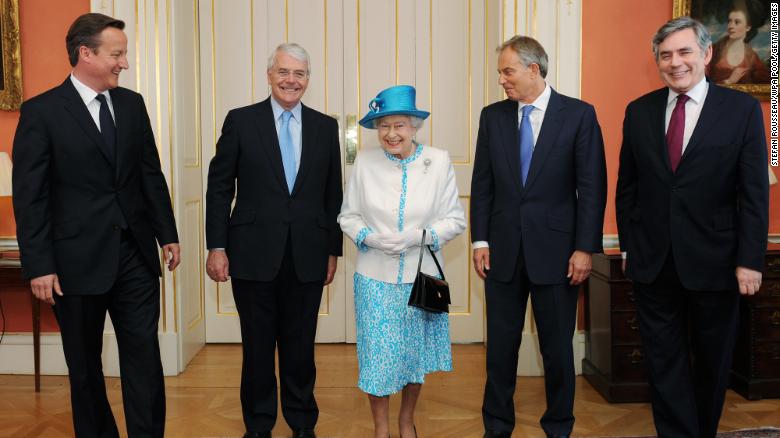
In celebration of the Queen's Diamond Jubilee, which marked 60 years as British sovereign, then-prime minister David Cameron hosted a lunch at Downing Street for the monarch. The occasion was also an opportunity to catch up with several of her former premiers. Here she stands with Cameron (left), John Major (2nd from left), Tony Blair (2nd from right) and Gordon Brown (right) on July 24, 2012 in London.
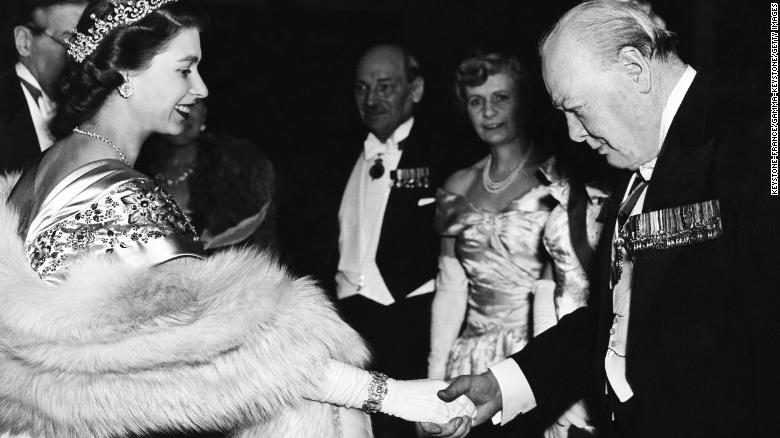
Winston Churchill (1951-1955): The Queen was said to be in awe of her first prime minister, Winston Churchill. Once when asked which PM she enjoyed meeting with most, she replied: "Winston of course, because it's always such fun."
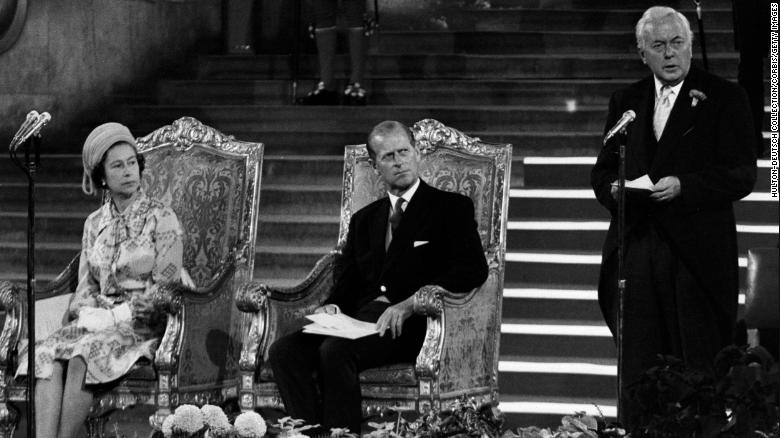
Harold Wilson (1964-1970, 1974-1976): Wilson, who came from a lower-middle-class background, became the Queen's first Labour Party prime minister. Wilson, seen here on the right, next to Prince Philip, often broke away from protocol, and he enjoyed helping with the washing-up after barbecues at Balmoral -- one of the Queen's residences. The Queen, however, warmed to Wilson's informal presence and even invited him to stay for drinks after their first meeting, which was not commonplace.
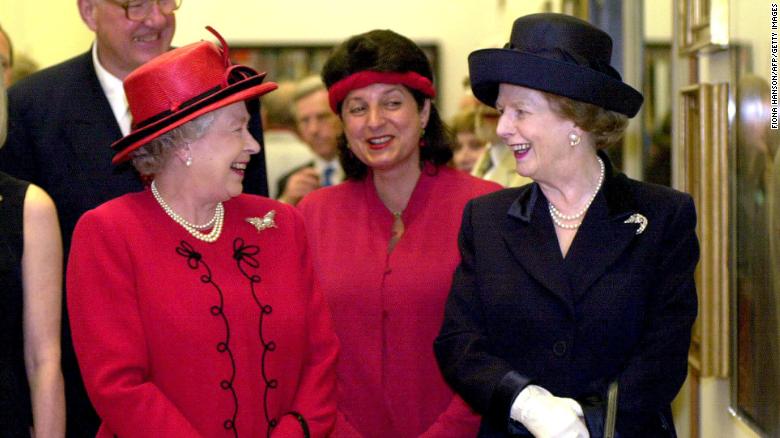
Margaret Thatcher (1979-1990): While Thatcher and the Queen were the closest in age, Thatcher kept their encounters strictly professional, formal and famously stiff. The "Iron Lady," as she became known, reportedly had a tense relationship with the monarch during their traditional weekly meetings. Thatcher also viewed her annual visits to the royal home in Balmoral as interrupting her work. Despite this, Thatcher is said to have been incredibly respectful of the Queen and eventually became her longest-serving prime minister.
